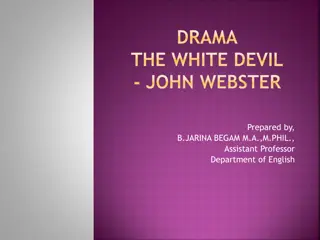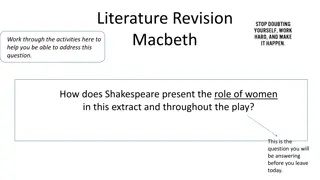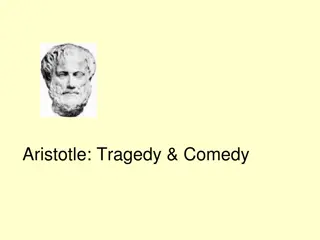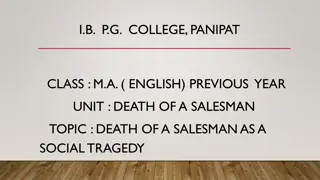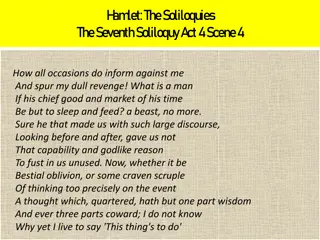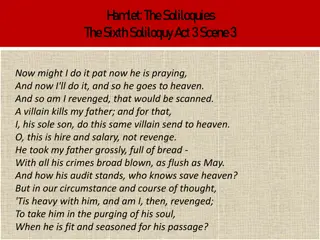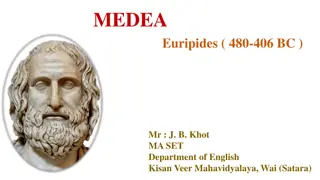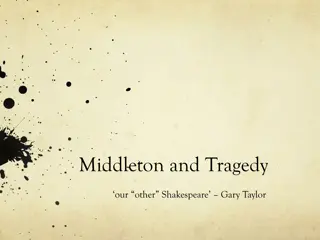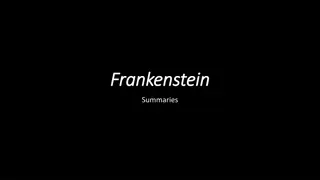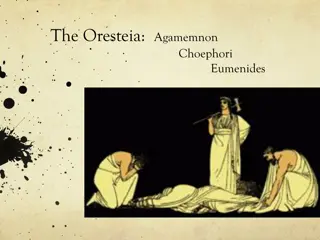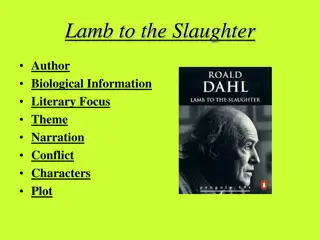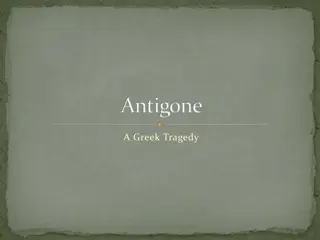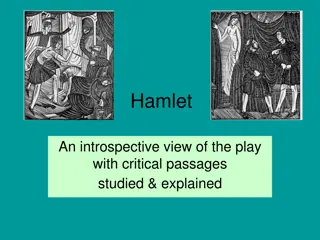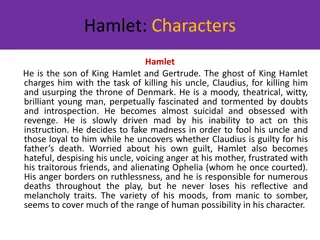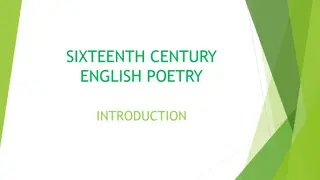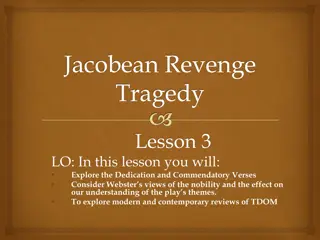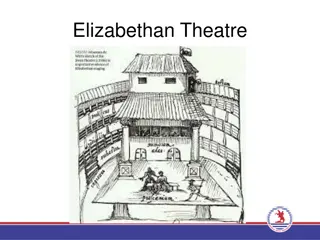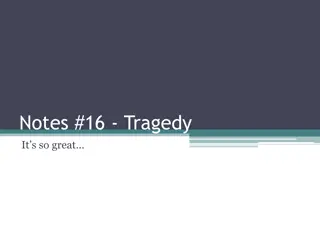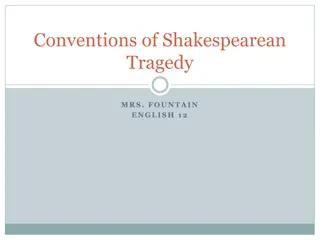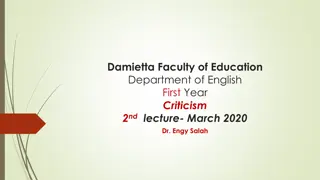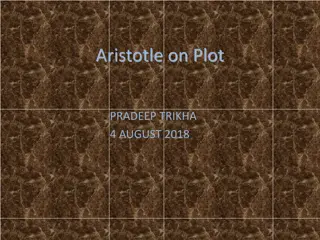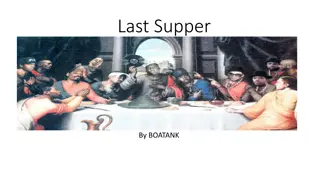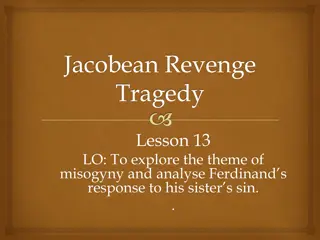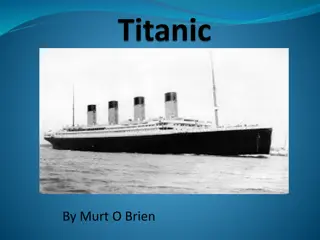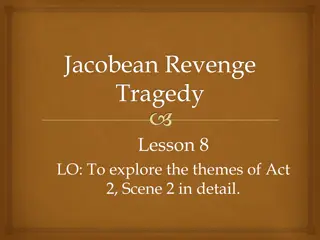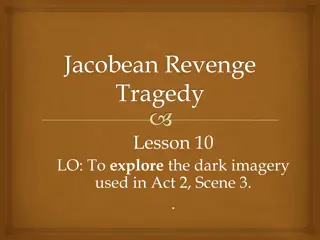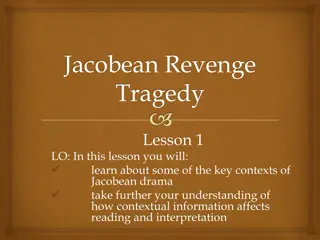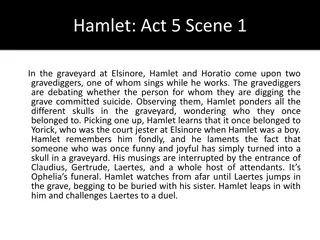Analysis of John Webster's Play "The White Devil" and Its Themes
John Webster's play "The White Devil" is a revenge tragedy that explores themes of revenge, retribution, and cyclical nature of vengeance. The complex characters, intricate plot, and genre-bending elements make it a significant work in English literature, despite initial poor reception. The play del
8 views • 27 slides
Bhopal Gas Tragedy: A Devastating Industrial Disaster
Among the worst industrial disasters of its time, the Bhopal Gas Tragedy occurred on 3rd December 1984 in Bhopal, Madhya Pradesh, India. The tragedy was caused by the release of 27 tons of Methyl Isocyanate gas by the Union Carbide Corporation, resulting in the exposure of over 500,000 people. To da
6 views • 20 slides
Exploring Women's Roles in Shakespeare's Macbeth
In this literature revision task focused on Macbeth, we delve into the portrayal of women, particularly Lady Macbeth, in the play. The activities include analyzing expectations vs. reality of women's behavior in the Jacobean era, examining Lady Macbeth's control and loss of it in her relationship wi
1 views • 16 slides
Aristotle's The Poetics: Tragedy and Comedy Analysis
Aristotle, the Greek philosopher, introduced key concepts in his work The Poetics, focusing on tragedy and comedy. He countered Plato's views on literature and emphasized the importance of imitation, catharsis, and the unity of time, place, and action in dramatic composition.
0 views • 32 slides
Death of a Salesman as a Social Tragedy: A Sociological Perspective
Arthur Miller's "Death of a Salesman" explores the social realities faced by the common man, portraying the struggles between the individual and society. Willy Loman, the protagonist, embodies the victim of the American Dream, highlighting the societal pressures and expectations that lead to his tra
1 views • 12 slides
Hamlet's Seventh Soliloquy: Reflections on Revenge and Inaction
Prince Hamlet reflects on the nature of revenge, his own inaction, and the contrast between his hesitation and the willingness of soldiers to die for trivial causes, ultimately resolving to be resolute and decisive in seeking retribution.
2 views • 9 slides
Analysis of Hamlet's Sixth Soliloquy in Act 3, Scene 3
Hamlet's Sixth Soliloquy in Act 3, Scene 3 delves into his inner turmoil as he contemplates seeking revenge on Claudius for his father's murder. Despite having the perfect opportunity to kill Claudius while he prays, Hamlet hesitates, questioning whether sending him to heaven would truly be an act o
0 views • 7 slides
Literature and Historical Events in the Early 17th Century
Queen Elizabeth's death, James I's reign, Charles I's civil war, and Cromwell's era marked the early 17th century. Major literary works by Donne, Jonson, and Bacon flourished, reflecting the social and political turmoil of the time. Jacobean writers like Herbert and Marvell emerged, paving the way f
6 views • 7 slides
Exploring the Tragedy of Medea by Euripides
Discover the gripping tale of Medea, a powerful sorceress seeking ruthless revenge after being betrayed by her husband, Jason. Dive into the world of ancient Greek tragedy as Medea's story unfolds, showcasing themes of injustice, passion, and the consequences of betrayal.
2 views • 23 slides
Tragedy in Renaissance England: A Comparative Analysis of Shakespearean Influences
Tragedy in Renaissance England was influenced by classical Greek and Roman models as well as late medieval works like those by Seneca and John Lydgate. Shakespeare and his contemporaries drew inspiration from these sources, creating intense explorations of suffering, evil, and the fall of exceptiona
3 views • 16 slides
Summary of Frankenstein: Friendship, Tragedy, and Guilt
Unlike Walton, Victor has friends in Elizabeth and Henry Clerval. As Victor delves into science, particularly alchemy, he discovers the power and potential destructiveness of knowledge. Tragedy strikes with Elizabeth's illness and his mother's death, leading Victor to study science seriously. His ac
0 views • 12 slides
Greek Tragedy: From Oedipus Rex to Sophocles' Legacy
Greek tragedy, rooted in societal changes of Greek culture, explores the arrogance of tragic protagonists like Oedipus. The form and structure of tragedies aim to evoke catharsis in audiences through a journey of fear and emotions. Playwrights like Aeschylus, Euripides, and Sophocles contributed dis
2 views • 13 slides
A River by A.K. Ramanujan - Poetic Reflection on Realism and Tragedy
Attipate Krishnaswami Ramanujan's poem "A River" portrays a stark reality of a river in Madurai that dries up, contrasting with poets who only sing of floods. The poem criticizes traditional poetic portrayals while ironically becoming a violation of realism itself. Ramanujan's poignant verses delve
0 views • 17 slides
The Oresteia: Agamemnon, Choephori, Eumenides - Reflections on War, Revenge, and Reconciliation
The Oresteia trilogy delves into themes of war, revenge, and reconciliation through the story of Agamemnon, Clytemnestra, and the chorus. It explores the aftermath of the Trojan War, highlighting the cycles of violence and the quest for justice. Through vivid imagery and powerful storytelling, the p
1 views • 16 slides
Insights into Elizabethan Beliefs in Shakespeare's "Hamlet
Act 1, Scene 1 of "Hamlet" introduces characters and Elizabethan beliefs like ghostly encounters, the power of Latin to exorcise spirits, and the constraints of ghosts. Horatio's skepticism evolves, validating ghostly apparitions for the audience. The scene contrasts superstitions, hierarchy, and ed
0 views • 8 slides
Themes and Characters in Shakespeare's "Hamlet
Delve into the themes of revenge and tragedy in Shakespeare's "Hamlet" through an analysis of key scenes, characters, and language techniques. Explore the consequences of revenge, character motivations, and the atmospheric contrasts between scenes. Uncover the intricacies of the opening scenes, char
0 views • 52 slides
'Lamb to the Slaughter' by Roald Dahl: A Tale of Betrayal and Revenge
Dive into Roald Dahl's darkly humorous short story, "Lamb to the Slaughter," where Mary seeks revenge on her husband Patrick with a cunning act of murder. The story unfolds with irony, betrayal, and conflict as Mary outwits the detectives investigating the crime. Through a gripping plot and unique n
1 views • 9 slides
Unorthodox SQL Techniques Unleashed: REVENGE: The SQL
Explore the unconventional realm of SQL with Rob Volk as he delves into extreme methodologies for manipulating data. From revenge-driven practices to extreme server admin tricks, this session is a wild ride through unparalleled SQL strategies.
0 views • 16 slides
Revenge in Poetry and Prose
Analyze the theme of revenge in William Blake's "A Poison Tree" and Edgar Allan Poe's "The Cask of Amontillado." Compare the use of point of view, imagery, irony, and thematic elements in both works. Engage in critical thinking discussions, visual representations, and thematic statement writing to d
0 views • 9 slides
The Elements of Greek Tragedy
Delve into the key components of Greek tragedy, exploring the characteristics of a tragic hero, the concept of tragic flaw (Hamartia), classic moments in the tragic plot, Aristotle's definition of tragedy, and the dramatic unities in a play. Discover the structure of a tragedy, from the prologue to
0 views • 19 slides
Intriguing Depths of Shakespeare's Hamlet
Delve into the world of Hamlet, a timeless play by Shakespeare, through critical passages and explanations. Uncover the basic and detailed background information, the dramatic structure overview, basic plot structure, and the genre of revenge tragedy that shape this introspective masterpiece.
0 views • 20 slides
Character Analysis of Hamlet: A Tragic Tale of Revenge and Betrayal
Son of King Hamlet, Hamlet is charged with avenging his father's murder by his uncle, Claudius, in Shakespeare's iconic play. As Hamlet spirals into madness and dark thoughts, he struggles with doubts, guilt, and revenge. Claudius, the cunning antagonist, hides his guilt while plotting against Hamle
0 views • 7 slides
Overview of Sixteenth Century English Poetry and the Renaissance
The introduction provides insights into sixteenth-century English poetry, the Renaissance era, and the defining characteristics of the period. It delves into the intellectual, religious, political, and social contexts of the time, highlighting key figures and movements like the Reformation, the Grea
1 views • 12 slides
Analyzing Ronald Reagan's Rhetorical Approach in The Space Shuttle Challenger Tragedy Address
Explore the rhetorical analysis of Ronald Reagan's address following the Space Shuttle Challenger tragedy. The analysis delves into the speech's purpose, Reagan's handling of blame, balancing tragedy with exploration, and the importance of leaders addressing the nation in times of crisis.
0 views • 26 slides
Sir Francis Bacon: A Prominent Figure in Writing Prose
Sir Francis Bacon (1561-1626) was a prominent figure known for his distinctive writing style during the Elizabethan and Jacobean Ages. His Essays, first published in 1597 and expanded in 1625, cover a wide range of philosophical, political, moral, and social topics. Bacon's legacy as a scientist, ph
0 views • 5 slides
Dedication and Commendatory Verses in Jacobean Revenge Tragedy Lesson
In this lesson, we delve into the Dedication and Commendatory Verses of Jacobean Revenge Tragedy plays, particularly focusing on Thomas Middleton's commendation in Latin, Webster's dedication to George Harding, and the significance of Latin in academia. Through analysis of these elements, we gain in
0 views • 9 slides
Insights into Elizabethan Tragedy and Classical Influence in Drama
Explore the world of Elizabethan theatre, the influence of classic Latin drama, and the evolution of tragedy from the 16th century to modern times. Learn about the elements of tragedy, the shift in tragic heroes from kings to middle-class individuals, and key concepts like hamartia, nemesis, and cat
0 views • 7 slides
Tragedy in Literature
Exploring the essence of tragedy in literature, this content delves into definitions, terminology, and elements of tragic plays. It covers concepts like catharsis, hamartia, and the characteristics of Shakespearean tragedy, offering insightful perspectives and prompts for analysis.
0 views • 6 slides
Shakespearean Tragedy: Conventions and Characteristics
Delve into the world of Shakespearean tragedy through the examination of key conventions such as the tragic hero, plot development, and themes. Understand the aspects of tragedy and drama, including blank verse, soliloquy, aside, dramatic irony, and foreshadowing. Discover how these elements come to
0 views • 10 slides
Aristotle's Tragic Theory: Elements and Concepts Explained
Explore Aristotle's analysis of tragedy, including the six parts of tragedy, the definition of catharsis, the characteristics of a tragic hero, the concept of hamartia, and the comparison between epic and tragedy. Delve into the essence of tragedy as a medium for purging emotions and moral enlighten
0 views • 10 slides
Tragedy in English Literature: An Overview
Tragedy, as defined by Aristotle, is the imitation of a serious action complete in itself, depicted through language and incidents that evoke pity and fear. This introduction delves into the key elements of tragedy, such as plot, character, thought, diction, song, and spectacle, with a focus on Thom
0 views • 13 slides
Aristotle on Plot and Tragedy: Understanding the Components and Structure
Aristotle's timeless insights on plot and tragedy delve into the constituent parts of tragedy, the structure of plot, types of plot, and the characteristics that make a plot effective. His definition emphasizes the importance of character flaws leading to the reversal of fortune in a well-crafted na
0 views • 7 slides
Betrayal and Revenge in "Last Supper" Poem by Liz Lochhead
Last Supper" by Liz Lochhead delves into themes of unfaithfulness, deceit, humiliation, and revenge through the narrative of a cheating boyfriend exposed by his partner. The poem employs various literary techniques like similes, imagery, and parenthesis to vividly depict the protagonist's wrath and
0 views • 8 slides
Misogyny in Jacobean Revenge Tragedy
The theme of misogyny in Jacobean revenge tragedy plays like "The White Devil" and "The Duchess of Malfi" is examined, focusing on the societal and biblical contexts that influence the portrayal of female characters. Through analysis of Ferdinand's response to his sister's sin, the exploration delve
0 views • 8 slides
Tragedy of the Titanic: A Story of Luxury, Disaster, and Heroism
The Titanic, a symbol of opulence and tragedy, was built in Belfast in 1912 before meeting its fateful end. Divided by class, the ship boasted lavish accommodations for the wealthy and basic quarters for others. Despite warnings of icebergs, Captain Edward J. Smith's pursuit of speed led to the ship
0 views • 10 slides
Analysis of Shakespeare's Tragic Play - Hamlet
The story of Hamlet unfolds in Denmark, revolving around the themes of revenge, madness, and deception. The protagonist, Hamlet, seeks to avenge his father's death while grappling with moral uncertainty. As the narrative unfolds, layers of deceit, betrayal, and tragedy are revealed through complex c
0 views • 6 slides
Themes in Act 2, Scene 2 of Jacobean Revenge Tragedy
Act 2, Scene 2 delves into the unfolding drama at the Duchess's palace, revealing suspicions of the Duchess's pregnancy, accusations of theft, and the birth of a son amidst intrigue and betrayal. This scene showcases themes of suspicion, trust, superstition, and deception, setting the stage for furt
0 views • 11 slides
Dark Imagery in Jacobean Revenge Tragedy
Delve into the intricate use of dark imagery in Act 2, Scene 3 of a Jacobean revenge tragedy. Analyze a compelling quotation, unraveling layers of meaning, exploring punctuation nuances, and linking it back to the context and critical readings. Engage with classmates to share insights and interpreta
0 views • 7 slides
Key Contexts of Jacobean Drama
Explore the key contexts of Jacobean drama, including themes of revenge, ethical arguments, and the influence of ancient philosophers like Aristotle. Understand the origins of tragedy and delve into the elements that define Jacobean Tragedy. Discover the relevance of Plautus and Seneca, and examine
0 views • 11 slides
Tragedy in Elsinore: Hamlet's Final Acts
Hamlet encounters the gravediggers, reflects on life and death in the graveyard, and faces betrayal and tragedy in a series of duels orchestrated by Claudius. As the plot unfolds, there are deaths, poisoned schemes, and Hamlet's own demise, ending with Fortinbras claiming the throne. The major plot
0 views • 5 slides
